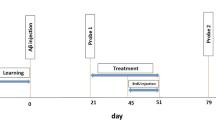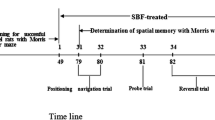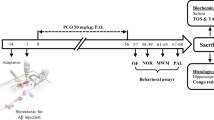Abstract
Objective
To observe the effect of total coptis alkaloids (TCA) on β-amyloid peptide (A β25–35) induced learning and memory dysfunction in rats, and to explore its mechanism.
Methods
Forty male Wistar rats were randomly divided into four groups: the control group, the model group, the TCA low dose (60 mg/kg) group and the TCA high dose (120 mg/kg) group, 10 in each. A β25–35 (5 μ l, 2 μ g/μ l) was injected into bilateral hippocampi of each rat to induce learning and memory dysfunction. TCA were administered through intragavage for consecutive 15 days. Morris Water Maze test was used to assess the impairment of learning and memory; concentration of malondialdehyde (MDA) in cerebral cortex was determined by thiobarbituric acid reactive substance to indicate the level of lipid peroxidation in brain tissues; activity of manganese-superoxide dismutase (Mn-SOD) in cerebral cortex was determined by xanthine-oxidase to indicate the activity of the enzyme; and NF-κ B protein expression in cerebral cortex was measured by SP immunohistochemistry.
Results
(1) Morris Water Maze test showed that, during the 4 consecutive days of acquisition trials, the rats in the model group took longer latency and searching distance than those in the control group (P<0.01), which could be shortened by high dose TCA (P<0.05); during the spatial probe trial on the fifth day, the rats in the model group took shorter searching time and distance on the previous flat area than those in the control group (P<0.01), which could be prolonged after TCA treatment (for low dose group, P<0.05; for high dose group, P<0.01). (2) Analysis of cerebral cortical tissues showed that, compared with the control group, MDA level got significantly increased and Mn-SOD activity decreased in the model group (both P<0.01). After having been treated with TCA, the MDA level got significantly decreased (P<0.05 and P<0.01 respectively for low and high dose group), while relative increase of Mn-SOD activity only appeared in high dose group (P<0.05). (3) Immunohistochemistry analysis showed the protein expression of NF-κ B got significantly increased after modeling, while high dose TCA can significantly inhibit it.
Conclusion
TCA could improve A β25–35 induced dysfunction of learning and memory in rats, and its protective mechanism is associated with its actions in decreasing MDA level, increasing Mn-SOD activity and inhibiting the expression of NF-κ B in cerebral cortex.
Similar content being viewed by others
References
Erme M, Geula C, Ransil BJ, et al. The acute neurotoxicity and effects upon cholinergic axons or intracerebrally injected beta-amyloid in the rat brain. Neurobiol Aging 1992;13:553–559.
Kowall NW, Beal MF, Busciglio J, et al. An in vivo model for the neurodegenerative effects of β-amyloid and protection by substance P. Proc Natl Acad Sci USA 1991;88:7247–7251.
Hensley K, Floyd RA, Zheng NY, et al. P38 kinase is activated in Alzheimer’ s disease brain. J Neurochem 1999;72:2053–2058.
Rogers J, Webster S, Lue LF, et al. Inflammation and Alzheimer’ s disease pathogenesis. Neurobiol Aging 1996;17:681–686.
Akama KT, Albanese C, Pestell RG, et al. Amyloid β-peptide stimulates nitric oxide production in astrocytes through an NF-κ B-dependent mechanism. Proc Natl Acad Sci USA 1998; 95:5795–5800.
Tjernberg LO, Naslund J, Thyberg J, et al. Generation of Alzheimer amyloid β-peptide through nonspecific proteoplysis. J Biol Chem 1997;272:1870–1875.
Guo YY, Zhang Y. Study of experimental pharmacology of coptis anti-toxin soup. Chin Tradit Patent Med 1993;15(8):29–31.
Zhou LJ, Song W, Zhu XZ, et al. Protective effects of bilobalide on amyloid beta-peptide 25–35-induced PC12 cell cytotoxicity. Acta Pharmacol Sin 2000; 21(1):75–79.
Morimoto K, Yoshimi K, Tonohiro T, et al. Co-injection of β-amyloid with ibotennic acid induces synergistic loss of rat hippocampal neurons. Neuroscience 1998; 84:479–487.
Ye JW, Shang YZ, Wang ZM, et al. Huperzine A ameliorates the impaired memory of aged rat in the Morris Water Maze performance. Acta Pharmacol Sin 2000;21(1):65–69.
Frautschy SA, Baird A, Cole GM. Effects of injected Alzheimer β-amyloid cores in rat brain. Proc Natl Acad Sci USA 1991;88:8362–8366.
Kowall NW, McKee AC, Yankner BA, et al. In vivo neurotoxicity of β-amyloid β(1–40) and the β(25–35) fragment. Neurobiol Aging 1992;13:37–42.
Clemens JA, Stephenson DT. Implants containing beta-amyloid protein are not neurotoxic to young and old rat brain. Neurobiol Aging 1992;13:581–586.
Games D, Khan KM, Soriano FG, et al. Lack of Alzheimer pathology after beta-amyloid protein injections in rat brain. Neurobiol Aging 1992; 3:569–576.
Bales KR, Du Y, Dodel RC. The NF-kappaB/Rel family of proteins mediates Abeta-induced neurotoxicity and glial activation. Brain Res Mol Brain Res 1998;57:63–72.
Author information
Authors and Affiliations
Corresponding author
Rights and permissions
About this article
Cite this article
Yang, Zq., Yang, Sf., Yang, Jq. et al. Protective effects and mechanism of total coptis alkaloids on A β25–35 induced learning and memory dysfunction in rats. Chin. J Integ. Med. 13, 50–54 (2007). https://doi.org/10.1007/s11655-007-0050-8
Received:
Issue Date:
DOI: https://doi.org/10.1007/s11655-007-0050-8




